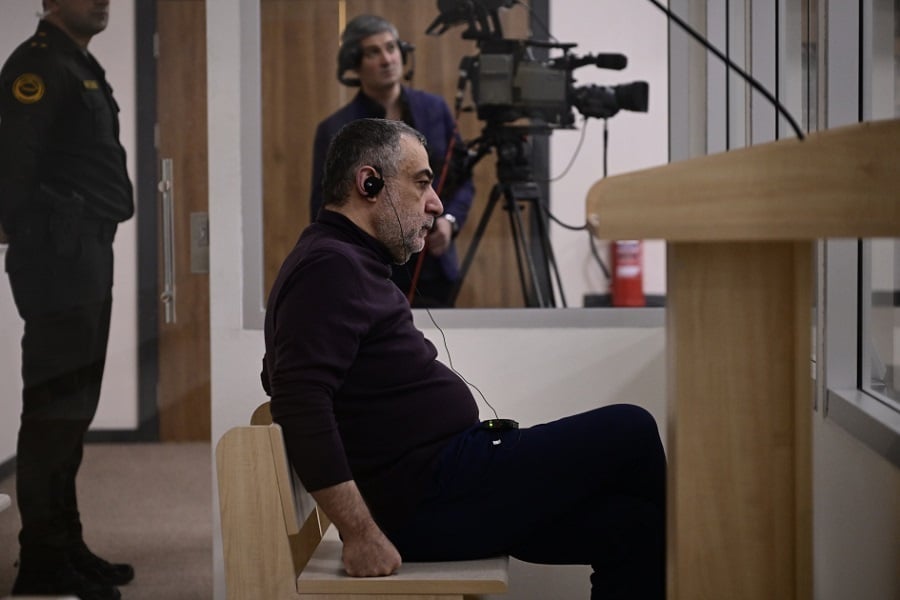On September 27, 2023, during the forced displacement of thousands of Artsakh Armenians to Armenia, Ruben Vardanyan, a well-known philanthropist and humanitarian, was arrested near the Hakari Bridge by Azerbaijani authorities and transferred to a prison in Baku. Vardanyan had briefly served as State Minister of the Republic of Artsakh from November 4, 2022 to February 23, 2023. After being dismissed from office, he chose to remain in Artsakh in order to stand by its people during the blockade.
Following Ruben Vardanyan’s arrest in late September and early October 2023, several other prominent figures from Artsakh were also detained by Azerbaijani authorities, including Davit Babayan, former Foreign Minister of Artsakh; Levon Mnatsakanyan, former Defense Minister of Artsakh; Davit Manukyan, former Deputy Commander of the Artsakh Defense Army; former presidents Arkadi Ghukasyan, Bako Sahakyan, Arayik Harutyunyan; and Davit Ishkhanyan, Speaker of the Artsakh Parliament.
On April 5, 2024, Ruben Vardanyan declared a hunger strike in Baku prison, demanding his and other unlawfully detained Armenian prisoners’ immediate and unconditional release. He continued the strike until April 24, Armenian Genocide Remembrance Day. It was later revealed that he had been subjected to torture throughout the hunger strike.
On June 13, 2024, Ruben Vardanyan’s international legal team submitted an urgent appeal to the United Nations Special Rapporteur on Torture, reporting acts of torture and inhumane treatment inflicted on him by the Azerbaijani government.
Read also
In November 2024, Ruben Vardanyan’s international attorney Jared Genser announced that the Prosecutor General’s Office of Azerbaijan had denied him entry to Baku, violating international legal norms.
On December 16, 2024, Ruben Vardanyan’s legal team revealed that around 42 potential charges had been filed against him. If convicted, he could face life imprisonment. The charges are based on 20 different articles of Azerbaijan’s Criminal Code. The fabricated “evidence” spans 422 volumes — more than 105,000 pages, all in Azerbaijani. No proper translation or reasonable time has been provided for review.
On December 28, 2024, Azerbaijan’s Prosecutor General announced that the cases of 16 Armenian prisoners were being transferred to court.
On January 16, 2025, Ruben Vardanyan managed to send a message through his family, declaring that, since the day of his arrest, he had never testified, that all documents bearing his signature were forged, and that both his lawyer and translator had been forced to sign those documents.
On January 17, 2025, Amnesty International responded to Ruben Vardanyan’s statement, urging the Azerbaijani authorities to ensure his right to a fair trial.
On January 17, 2025, nearly one year and five months after his unlawful detention, a so-called “trial” began at the Baku Military Court. Although Azerbaijani authorities had promised “open trials,” only the state-run AZERTAC media outlet was allowed access. All requests from independent international observers to attend were denied or ignored.
Ruben Vardanyan’s case is being tried separately from the other Artsakh leaders. In the very first session, Vardanyan requested to merge his case with the others, but the court rejected this and all of his other motions.
On January 19, 2025, Ruben Vardanyan announced a second hunger strike in protest of the ongoing judicial farce. “This so-called ‘trial’ is not just against me. It is an attempt to criminalize all Armenians – all those who supported and demonstrated compassion toward Artsakh and its people, all those who showed compassion. This is an attack on an entire nation. I refuse to participate in this farce.” The hunger strike lasted 23 days, severely weakening him, but it succeeded in drawing international attention to the sham trial being conducted in Azerbaijan.
On March 12, the European Parliament adopted a resolution condemning Azerbaijan’s inhuman treatment of Armenian detainees and demanding their immediate and unconditional release.
On March 7, 2025, during a Red Cross-facilitated phone call, Vardanyan managed to send a lengthy and first-ever voice message to his family, making several key statements and emphasizing that “this trial is not just about me and 15 others — all Armenians are on trial.”
On June 5, 2025, Ruben Vardanyan’s lawyer in Baku, Abraham Berman, issued a statement highlighting that criminal liability must be based on specific acts committed by an individual at a certain time and place, under conditions that made the act possible.
On July 11, 2025, lawyer Siranush Sahakyan, a representative of the interests of Armenian prisoners of war at the European Court of Human Rights, published a report detailing severe violations of Ruben Vardanyan’s rights in the Baku court. She concluded that the result was a fundamentally unjust legal process, depriving the defense of any realistic opportunity to contest the charges or prove innocence.
As of September 3, 2025, at the request of Azerbaijani authorities, the International Committee of the Red Cross (ICRC) officially announced its withdrawal from Azerbaijan. The ICRC was the only international organization authorized to visit Armenian detainees in Baku.
Since the beginning of the trial on January 17, 2025, there have been 36 court sessions over more than eight months. Throughout this time, no evidence has been presented proving Ruben Vardanyan committed any crimes personally. Moreover, many of the actions he is accused of would have been impossible for him to commit during the alleged timeframes. All so-called “witnesses” testified that they had never seen or known Vardanyan and had only heard about him through the media.




















































